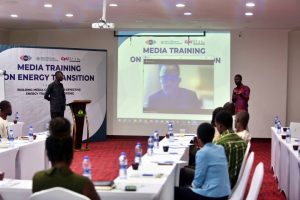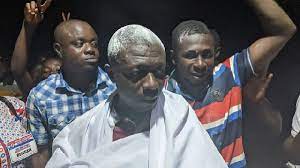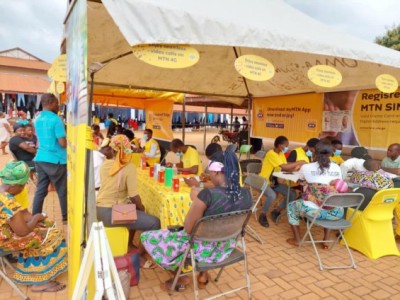Expert Makes Case for Energy Transition

At Training For Journalists
A Deputy Director at the Ministry of Energy, in making a case for energy transition, has lamented how the air in the national capital and surrounding communities, has been heavily polluted.
According to Dr. Robert Sogbadzi, so bad is the situation that, for now, if he wants clean and healthy air, he travels all the way to the Oti Region before he could inhale it.
In the past, he said, he drives to Aburi in the Eastern Region, but not anymore, as the situation keeps getting worse, emphasizing the need to adopt the Paris Agreement, a legally binding international treaty on climate change by 196 Parties at the UN Climate Change Conference (COP21) in Paris, France, on 12 December 2015.
He noted that, he was particularly excited about the clean air the transition will provide when Ghana finally shifts to clean energy, namely solar and wind, among others.
Dr. Sogbadzi made this known during a presentation at a day’s training workshop, organized under the auspices of Citi FM/TV and the Natural Resource Governance Institute (NRGI) for journalists on energy transition, held on Tuesday, November 28, in Accra.
He indicated that the opportunity for the energy transition will bring relief to many and help reduce lung diseases.
“The most interesting thing which I like about this energy transition is that we will get quality air to breathe. At first, if I want quality air, I go to Aburi Mountains to go and breathe.
“Now, I have to travel all the way to Oti Region to go and get fresh air.
“Oti Region, that place [there] is still fresh air. So, we will be able to get good air and that will prevent us from not having the lung diseases or anything that is related to carbon monoxide,” he said.
Aside from the clean air, Dr. Sogbadzi mentioned other advantages that Ghana stands to gain, saying its long term energy mix will lead to a cheaper source of energy, while there will be many jobs created, among others.
He said, “Ghana has the opportunity to install clean energy technology to have access to the green bond market, trade carbon credits as well as opportunities, based on economics, Ghana can safely transition in 2070 without going bankrupt, this is because by 2070, the Gross Domestic Product (GDP) will rise to $863.7billion with an average annual growth rate of 5%.”
According to him, the effects of climate change have made the world such a difficult place to live in, adding it is incumbent on every country, including Ghana, to put in place the needed measures to transition to reduce the effect of climate change.
He said even though Ghana emits only 0.5 and Africa’s is 3.8, they have no option but to contribute their quota to make the energy transition successful.
The energy expert said neither Ghana nor Africa can afford to say because it produces a small amount of pollution, it will not join the rest of the world.
“But there’s one thing I always say that we are on this planet and if you are in space you see it like blue pearl let’s consider that we are all in the boat and there is a hole in the boat and you didn’t make that hole but this boat is taking up water because of the hole, so you will sit down and say that you that because I didn’t make the hole so whoever made that hole should seal the hole when the boat filled up unless you can walk on water, we will all sink.
“So that is why we all have to come together to make sure that we solve this issue of emissions else we have not done anything but right now as Akosombo Dam spilled, as cerebral meningitis is increasing and all others and even now you are seeing mosquitos at Aburi which I didn’t use to see.


“Because the system is getting warm and mosquitos are moving to warm environment, they normally don’t go to cold environment, so those who did ever see malaria rise will now be seeing malaria rise in their regions. So, this is the thing. Somebody has caused their thing but we are now suffering from it so we need to address this,” Dr. Sogbadzi said.
He cautioned Ghana, which has promised to complete the energy transition in 2070, against the world’s 2030, to ensure it maximizes the opportunities that the transition will come with and minimize the adverse effects in order not to end up, like South Africa, which hurriedly started the process without the requisite measures.
Themed “Building Media Capacity For Effective Energy Transition Reporting,” the training programme also had a legal perspective.
A senior lecturer at the Ghana Institute of Management and Public Administration (GIMPA), who is also the Country Principal, Client Earth, Clement Akapame, speaking on the topic “Existing Policy, Legal and Regulatory Framework for Energy Transition,” said despite Ghana committing to international associations to do the energy transition in due course and there is currently talks about it locally, the government is yet to develop a policy framework legally bidding for the transition.
The one-time journalist said this could make the transitioning process a bit difficult because government could not be held liable in court, depending on the current laws.
He said though government is signatory to many agreements globally, when it comes to climate change and energy transition, it is yet to localize them or include them in municipal laws.
“So now our law is clear that when you sign an international convention, even when it is ratified by Parliament, it is not enough. You would have to reduce the tenet of international convention or agreement into the municipal law or domestic law. So, an act of Parliament, a regulation must be passed by Parliament to give it recognition to the provision international law,” he further said.
He intimated that Ghana’s sources of law on climate change will come from both domestic legislations and international laws, saying “And at the level of international law, we will not have our courts enforce those international provisions if we have not reduced them into acts of Parliament or regulations.”
“So, if we want to be very strong with our commitment under that Paris Agreement, we need to start reducing these agreements into domestic legislations because that is where I will be able to hold government responsible in court to say because of provision in act this, you are unable to do that but currently our framework for dealing climate change is largely within the policy and strategy level without clear legislation,” Mr. Akapame added.
Dr. Riverson Oppong, manager, Commercial Operations at Ghana Gas Company Limited, said though he is not against the energy transition discussion, the movement should be tackled holistically, and prayed that the 2030 timeline given during the Paris Agreement would be met.
There was also a presentation from NRGI’s Patrick Stephenson virtually. Other journalists from across the country also joined the training virtually.
Source: Anchorghana.com




